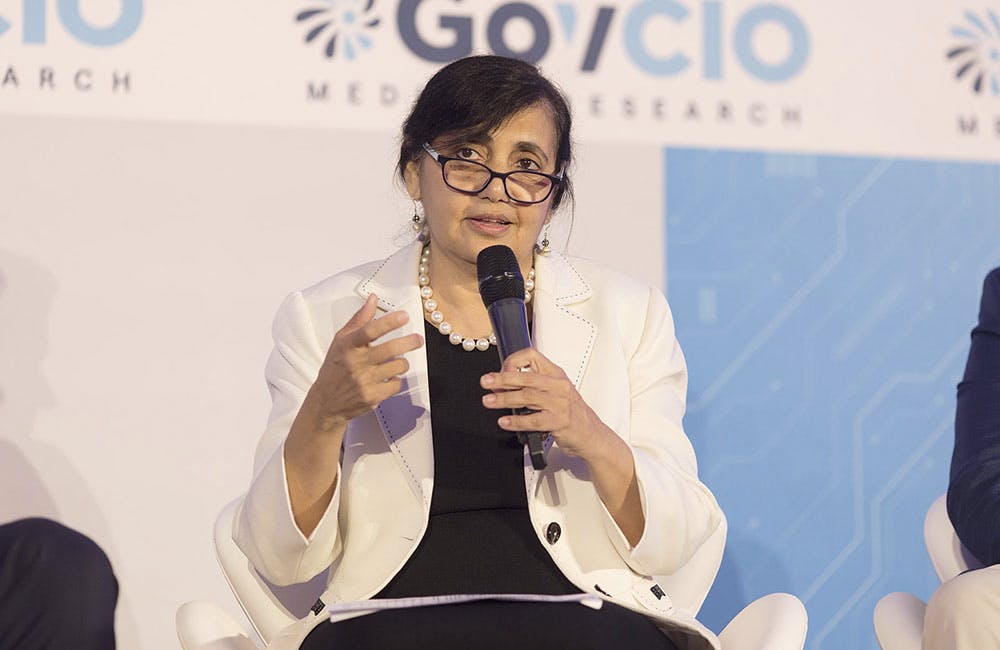SOCOM Chief: Get Tech in People’s Hands to Innovate Faster
The workforce has a prominent focus in Gen. Richard Clarke’s modernization priorities as data efforts gain speed.

Technology innovation requires getting it in the hands of the operators to experiment with it, U.S. Special Operations Command (SOCOM) Commander Gen. Richard Clarke told attendees Tuesday at the Special Operations Forces Industry Conference in Tampa, Florida.
It’s a sentiment that reflects the first of SOCOM’s commanding truths — that “people, not equipment, make the critical difference,” and the first of Clarke’s three key takeaways for this year’s conference.
“While it’s humans who fight, it’s also those humans who will innovate. People create new technologies. People use tools in new ways,” Clarke said in his keynote address. “Our people are problem solvers. … They are combat credible, battle tested and culturally astute. Every investment we make at SOCOM must enhance the effectiveness of our personnel.”
This focus on personnel led to Clarke’s two other takeaways: the power of partnerships and strategic investments.
Clarke described the current defense climate as one where data and technology innovation will be critical to combatting cybersecurity threats and disinformation campaigns like those coming from Russia with the Ukraine conflict. He also cited the rapid development from China as our “pacing threat.”
“Our adversaries must be convinced that we can and will prevail,” Clarke said. “In the coming years, China will become our most capable adversary, and they are rapidly modernizing. The Department of Defense dubs [China] our ‘pacing threat.’”
Part of this will necessitate getting rid of what’s not working, such as unmanned aerial vehicles (UAVs) with only a single purpose, and focusing more on getting the most “bang for the buck.”
“We need to look hard at all the systems, which ones within our confines are the biggest bang for the buck?” he said. Take the past 20 years of innovation around aerial intelligence, surveillance, and reconnaissance (ISR), for example, “we need to layer in space, layer open-source data with that.”
“We’re not going to buy our way with overhead UAVs,” Clarke said. “There are so many capabilities that have to come together.”
This prioritization in strategic investments also means aligning the program executive offices accordingly with industry capabilities and being in sync with SOCOM’s Acquisition, Technology, and Logistics (AT&L) arm.
“Data will play a significant role in modernization efforts,” Clarke said, adding that the service hired its first chief data officer in 2018. “Our data is so important that many of the components are also hiring data officers. … But is our CDO a chief data officer or a chief digital officer? We still need to suss that out.”
Tools and technology are still a challenge, even in the face of less obvious threats.
“I still don’t think that we have all the tools that we need and to continue to develop that at speed, and how do we push back inside the information space?” Clarke said. “We have to look at how we are going to operate in other places. [The war in Ukraine] is relatively easy because everybody can see it.”
Moving forward, Clarke noted that there are still challenges in how the military and specifically SOCOM hires and retains the talent Clarke envisions as critical for keeping pace with technological innovation. One of those is the security clearance process.
“It’s something that the Department of Defense has been saying we’re going to solve for years and we still have not,” Clarke said. “We got to be able to adapt our practices to be able to bring someone in faster.”
This is a carousel with manually rotating slides. Use Next and Previous buttons to navigate or jump to a slide with the slide dots
-

Modernizing IT Systems for AI Adoption
USPS, NIH and Lumen discuss how modernization, data strategies and security are shaping AI’s future role in government.
20m watch -

NSF Wants Industry Driving Quantum Innovation
The agency is pushing for partnerships to enhance the research community as Congress weighs additional legislation.
3m read -

Modernizing Critical Infrastructure in the Face of Global Threats
Officials are expanding the latest strategies in boosting defense infrastructure, including securing satellite communications, upgrading enterprise-wide technology, optimizing data management.
20m watch -

Opinion: Original Intelligence Is the Missing Piece for AI Transformation
Limitations of AI agents and development drive growing needs for workforce development and "original intelligence."
3m read -

The Next AI Wave Requires Stronger Cyber Defenses, Data Management
IT officials warn of new vulnerabilities posed by AI as agencies continue to leverage the tech to boost operational efficiency.
5m read -

Federal CIOs Push for ROI-Focused Modernization to Advance Mission Goals
CIOs focus on return on investment, data governance and application modernization to drive mission outcomes as agencies adopt new tech tools.
4m read -

Agencies Push Data-Driven Acquisition Reforms to Boost Efficiency
New initiatives aim to increase visibility of agency spending, improve data quality and create avenues to deploy solutions across government.
5m read -

Data Transparency Essential to Government Reform, Rep. Sessions Says
Co-Chair of the Congressional DOGE Caucus Rep. Pete Sessions calls for data sharing and partnerships to reduce waste and improve efficiency.
5m read -

DOD Can No Longer Assume Superiority in Digital Warfare, Officials Warn
The DOD must make concerted efforts to address cyber vulnerabilities to maintain the tactical edge, military leaders said at HammerCon 2025.
4m read -

DHA CDAO Spearheads Master Data Catalog to Boost Transparency
Jesus Caban plans to boost DHA's data maturity through a new master data catalog, governance frameworks and inventory of tech tools.
5m read -

IRS Makes Direct File Code Public as Lawmakers Debate Program’s Fate
The agency sees the Direct File source code as beneficial to government digital services despite what happens with it in proposed budgets.
5m read -

A Look at Federal Zero Trust Transformation
Recent developments from CISA and DOD show how government is advancing zero trust quickly.
20m read
















